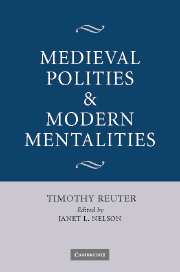Book contents
- Frontmatter
- Contents
- Editor's note
- Acknowledgements
- List of abbreviations
- Editor's introduction
- PART I MODERN MENTALITIES: HISTORIOGRAPHIES, METHODOLOGIES, PRECONCEPTIONS
- 1 Modern mentalities and medieval polities
- 2 Medieval: another tyrannous construct?
- 3 The insecurity of travel in the early and high Middle Ages: criminals, victims and their medieval and modern observers
- 4 Debating the ‘feudal revolution’
- 5 Pre-Gregorian mentalities
- 6 Whose race, whose ethnicity? Recent medievalists' discussions of identity
- PART II THE SYMBOLIC LANGUAGE OF MEDIEVAL POLITICAL ACTION
- PART III POLITICAL STRUCTURES AND INTENTIONS
- Index
3 - The insecurity of travel in the early and high Middle Ages: criminals, victims and their medieval and modern observers
Published online by Cambridge University Press: 12 August 2009
- Frontmatter
- Contents
- Editor's note
- Acknowledgements
- List of abbreviations
- Editor's introduction
- PART I MODERN MENTALITIES: HISTORIOGRAPHIES, METHODOLOGIES, PRECONCEPTIONS
- 1 Modern mentalities and medieval polities
- 2 Medieval: another tyrannous construct?
- 3 The insecurity of travel in the early and high Middle Ages: criminals, victims and their medieval and modern observers
- 4 Debating the ‘feudal revolution’
- 5 Pre-Gregorian mentalities
- 6 Whose race, whose ethnicity? Recent medievalists' discussions of identity
- PART II THE SYMBOLIC LANGUAGE OF MEDIEVAL POLITICAL ACTION
- PART III POLITICAL STRUCTURES AND INTENTIONS
- Index
Summary
On the death of William the Conqueror in 1087, the anonymous author of the Anglo-Saxon Chronicle wrote a lengthy obituary-notice, in which, among other things, he said: ‘We must not forget the good order he kept in the land, so that any man, if he himself were of any substance, could travel unmolested throughout the country with his bosom full of gold.’ In this sentence, we can see all four elements of our cluster of issues: the criminal, who waited impatiently for loot; the victim, plagued with the fear of being robbed; the ruler, whose self-perception required him to act to stem the problem; and the observer, who gives, or seems to have given, information either about crime in general or about particular criminal acts. Highway robbery represents only part of the general insecurity of the Middle Ages, but it was insecurity of an especially dangerous kind. On the roads, a person was cut off from the protection of the normal social environment – if also from the dangers of that environment. The people you met were strangers to you, and therefore threatening: William of Poitiers praises it as one of William the Conqueror's greatest achievements that in Normandy during his reign, a man did not immediately have to take flight if other armed men encountered him on the road. As soon as you left home, you perceived such men as strange and dangerous.
- Type
- Chapter
- Information
- Medieval Polities and Modern Mentalities , pp. 38 - 71Publisher: Cambridge University PressPrint publication year: 2006
- 4
- Cited by



